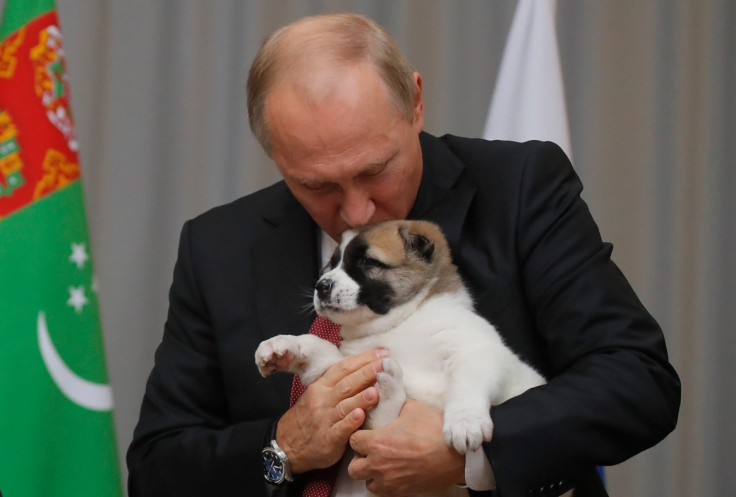Russian trolls didn't cause Brexit – but their global meddling is a real danger to democracy
Russia – a country run by gangsters, where the biggest gangster of all sits behind a desk in the Kremlin.
A great deal of what passes for left-wing internationalism today is actually the colonial mindset turned on its head. Whereas once the West was responsible for everything good in the world, today it is the source of everything that is bad.
Either way, the West remains at the centre of things, a great evil sun around which everything orbits.
It is hard to see where this is more obvious than in the case of Russia; a country run by gangsters, where the biggest gangster of all sits behind a desk in the Kremlin.
Yet behind the chest-thumping xenophobia and swashbuckling machismo of the country's carefully constructed public image, there is nothing remotely attractive about the Russian political system.
Russian GDP is about the same size as that of Italy. That figure is itself misleading, as a small number of very rich people who profited from the liberalisation policies of the 1990s control vast amounts of the country's wealth.
In terms of inequality, Russia is more unequal than the United States. Things do not appear to be improving either. The average monthly wage in Russia dropped by 8% last year.
Abroad, Russia pursues an aggressive policy of maintaining its 'sphere of influence', most notably sending its 'little green men' into Ukraine in 2014 and helping the Syrian dictator Bashar al-Assad to remain in power at a cost of hundreds of thousands of lives.
The knock-on effect of the Assad-Putin bombardment of Syria has been a refugee crisis that has arguably precipitated the return of fascism in countries such as Germany and Poland, as well as hastening Britain's exit from the European Union last year.
None of this is necessarily an indictment of the Russian people, who are fed a diet of lies and distortions by the country's state controlled media, but it does suggest that Russia is ruled by a leadership that most right-thinking people - especially outside the country where there is greater access to the truth of what is going on inside Russia - ought to find abhorrent.
And indeed, beyond the far-left and the far-right, there are few out-and-out supporters of Vladimir Putin in Britain. Yet many progressive-minded people seem reluctant to countenance that the Russian state might be seeking to further its own interests by interfering in the political systems of the West.

The mere notion that Russia is trying to exert any kind of subversive influence abroad is treated as if it were "dubious", and Russia were merely "a country with a different set of national interests and priorities from ours", as a fairly representative article in The Nation put it this week.
Yet it was revealed this week that Russian-linked Twitter accounts had posted almost 45,000 messages about Brexit within 48 hours during last year's referendum. This follows revelations in 2016 by the New York Times journalist Adrian Chen that Russian troll factories were apparently spreading pro-Donald Trump propaganda on social media.
Prior to that RT, Russia's state-funded television network, assiduously promoted Scottish independence. Last month RT was doing something similar for the Catalonian independence drive in Spain.
It would of course be a mistake to blame Brexit on Russian Twitter bots. It is too convenient by half, and lets off those politicians and policymakers who have for decades neglected huge swathes of Britain.
But it seems clear that Russia is intent on destabilising Western governments and hobbling its institutions, and this is something that warrants attention regardless of whether it proved decisive in the Brexit referendum or not.
One can switch on RT and see the Kremlin's agenda in action in real time. What passes as 'news' on the station is a mixture of relativism ("there is no such thing as objective reporting," as a former managing editor of RT told the journalist Peter Pomerantsev), conspiracy theories and a deluge of stories concocted to show the West in a bad light.
A spokesperson for the Russian President has previously said the creation of the organisation behind RT was needed because Russia required more "propaganda".
The real question, I suppose, is whether or not you think this is a product of the West's attitude to Russia or a predictable consequence of the Russian elite's desire to hold onto political power for as long as possible.
If you believe that Britain and America are fundamentally responsible for everything bad in the world, it makes sense to play down the malevolence of the Kremlin. And admittedly, should you wish to ignore some of the injustices that prevail in the UK, it seems you will see the hand of Russia behind almost everything.
What can't be denied is that Russia is seeking to exert at least some influence in the West in a way that would (rightly) provoke howls of protest were the United States or Britain to behave in a similar fashion. It was even reported in July that hackers linked to Russia had attempted to hack the UK energy grid.
Ultimately there are sensible policies that Britain might pursue vis-à-vis Russia and foolish policies. There is plenty of ground for debate as to what the correct approach may be.
But until we recognise that the Russian elite is pursuing its own political logic in its dealings with the West – rather than responding to some purported injustice carried out against Russia by NATO/the EU/America (pick as appropriate) – we have little hope of responding adequately to this obvious menace.
And it is a menace, even if a Conservative Prime Minister happens to think so too.
© Copyright IBTimes 2025. All rights reserved.






















